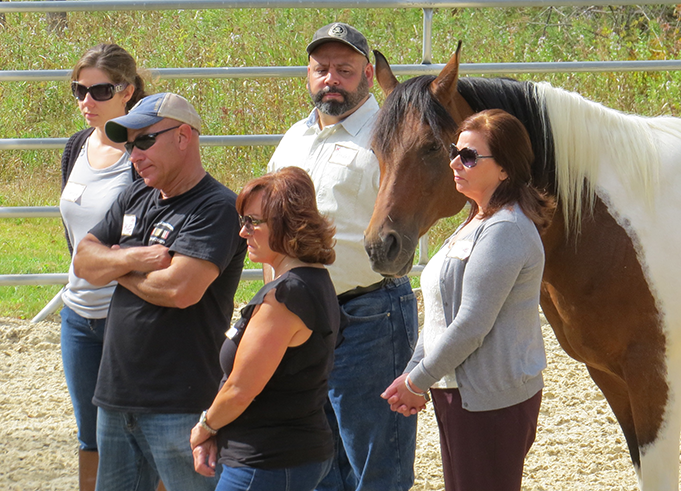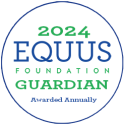Inside The Equus Effect
“Outside In” JUNE 7 & 8
Saturday, Sunday 10-4
“Insight Out” JULY 19 & 20
Saturday, Sunday 10-4
The Equus Effect is a sophisticated, structured, and comprehensive experiential learning with horses program that is designed to have a lasting impact on a broad range of clients. Our aim is to build participants’ capacity to have more successful and satisfying relationships at home, work and school. Benefits include:
- more effective communication
- healthier boundaries
- the ability to stay present and engaged in the face of conflict
- increased compassion for others
- responsiveness rather than reactivity to emotional triggers
- greater sense of agency
— tolerance for differences
— inner strength




ITEE Part I: Theory and Practice — Outside IN
Part I offers a chance for men and women who are interested in becoming facilitators for The Equus Effect, as well as those who are simply interested in learning how to apply the principles and practices of this program to their lives.
In this segment of the pre-training program, participants learn about the key elements that are foundational to our work and how these inform both the experiential, didactic and processing aspects of our curriculum.
While The Equus Effect was conceived with the veteran experience in mind, we have found these elements to be both relevant and meaningful to a much broader audience.
Since we all face both unique and universal challenges in life AND since key elements of our curriculum are grounded in the science behind all human development and neuroplasticity, we know that the same principles we use with veterans can be applied to our own lives and to the experiences of many who want to get better at navigating life’s challenges.
Resources and Tools
- Somatic Experiencing
In an Unspoken Voice – Dr. Peter Levine - Polyvagal Theory
Clinical Applications of Polyvagal Theory, Listening to my Body: A Guide – Dr, Steven Porges - Natural Horsemanship Theory and Skills
Seven Clinics, The Faraway Horses – Buck Brannaman, Horses Don’t Lie – Chris Irwin - Emotional Agility and Fitness Skills
Emotional Genius – Karla McLaren, Riding Between the Worlds, Linda Kohanov - Tools for Resilience
The Body Keeps the Score – Bessel van der Kolk, Waking the Tiger – Dr. Peter Levine
ITEE Part II – INSIGHT OUT
Part II provides students with the opportunity to look at what we each bring to the program as individuals who may wish to become facilitators or simply become more aware and more complete versions of themselves. This module is designed to identify and build on natural strengths, as well as to identify areas where one might not be as clear as one would like.
We all have various attitudes and styles that inform our unique approaches to this program as facilitators. In order to work with a wide variety of clients, understanding ourselves more deeply provides an excellent foundation for our ability to hold the space for others.
The Equus Effect program is designed to be taught by two facilitators. It is essential to understand our own strengths (and triggers) in a way that complements those of our partners. We have found this to be extremely useful in terms of seamless delivery of the didactic components of the curriculum as well as the willingness and capacity to ‘have each other’s back’.
The most important reasons for this are:
Congruence & Collaboration Participants are keenly aware of the relationship between those in positions of authority. Credibility and modeling are key – for individuals to move beyond their comfort zones in order to explore new ways of taking responsibility for their relationships at home, work and school.
Safety & Sensitivity When working with horses, it is much safer to have two sets of eyes on situations that can change in a moment, or to be able to support someone who needs to take a break while the rest of the class moves on.
Professional Skill And finally, when self awareness is taught in a systematic way that includes body language as well as how we spend our attention and energy, it becomes possible to ask clients insightful questions that would otherwise be difficult to ascertain.
Again, we use both experiential learning and didactic material to help students recognize key habits of mind and behaviors that they can use for both personal and professional development.
Resources and Tools
- The Enneagram
The Enneagram – Helen Palmer, The Wisdom of the Enneagram – Riso-Hudson - Internal Family Systems
Internal Family Systems Theory – Dr, Richard Schwartz - The Masterson Method
Beyond Horse Massage – Jim Masterson - Inquiry Practices
The Diamond Approach – A.H Almaas
Training to Facilitate
In order to enroll in the four-module training program students must complete both Parts I & II because each module includes sophisticated concepts that build on each other. Following Part I, we will arrange a conference to discuss goals and mutual fit for continuing to Part II and Facilitator Certification.
We want this work to be a win-win-win situation for you, The Equus Effect, and for your clients. We want it to meet the high standards and consistency we require, your goals for a successful practice, and ultimately, to exceed clients’ expectations for a uniquely enlightening and useful experience.
We truly believe that for facilitators as well as clients …
The range of what we think and do is limited by what we fail to notice
And because we fail to notice that we fail to notice.
There is little we can do to change what we fail to notice until we notice
How failing to notice shapes our thoughts and deeds.
— R.D.Laing
Between stimulus and response there is a space.
In that space lies our ability to choose a response.
And in that response lies our freedom and growth.
— Viktor Frankl


Logistics – Cost – Timing
To SIGN UP, please contact Kelly Hitt: Kelly@TheEquusEffect.org or call / text (203) 613-1107.
Inside The Equus Effect Parts I & II
are held at The Equus Effect farm:
37 Drum Road
Sharon, CT
Saturdays, Sundays
10:00 a.m. – 4:30 p.m.
Lunch included
Part I:
Cost $900/person
Part II:
Cost $900/person
PAYMENTS:
Payment by way of check is ideal for us due to processor fees with credit cards. However, if you do need to use a credit card, please email to set up a time to take your payment over the phone.
Please mail your check to:
The Equus Effect
Attn: Donna Larocque
37 Drum Road
Sharon, CT 06069
NOTE: Completion of Inside The Equus Effect Parts I & II are required for qualification to attend the full training. See Train to Facilitate page.
~ If you’d like to discuss any or all of this, please reach out ~
Feel free to call Kelly Hitt at (203) 613-1107 — or email Kelly@TheEquusEffect.org
DIRECTIONS
IMPORTANT!
Navigation apps do not work to our street address!!!
SET GPS to Sharon Town Beach, Mudge Pond Rd., Sharon, CT.
Drum Road is a Y-intersection directly across from entrance to the beach.
The facility is about 3/4 mile on the left.
Park in front of the red barn on the left or on the far side of the red cottage on the left.
NOTE: Please do not park or turn around in driveways on the right side of the road.
The Equus Effect
Address
37 Drum Road, Sharon, CT 06069
For general information:
Kelly Hitt
Communications &
Outreach Director
Kelly@TheEquusEffect.org
(203) 613-1107
Jane Strong, SEP, IFS Trained
Executive Director
Co-founder, Lead Facilitator
(860) 364-9985
David Sonatore, LCSW
Program Director
Co-founder, Lead Facilitator
(347) 439-1777



